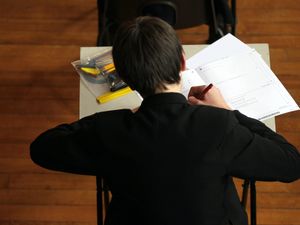Grammar schools advised to postpone 11-plus exams amid Covid-19 disruption
The Government advises delaying entrance tests until October or November, to allow children to catch up with learning.

Grammar schools should look to delay their entrance exams until as late as November, to allow children to catch up with missed learning due to Covid-19, Government guidance suggests.
The Department for Education has published advice for headteachers and local authorities on co-ordinating tests that determine whether pupils qualify for selective secondary schools.
It recommends that the tests, which usually take place in September, are moved back to late October or November, to give pupils more time back in the classroom before being assessed.
Parents should include at least one non-selective school in their preferences for secondary school places, in case their child’s test results are not known before the deadline of October 31.
Local authorities with grammar schools should offer all parents applying for a secondary school place at least one additional preference if possible to help address the same issue.
The guidance, ahead of many students returning to school full-time in September, after nearly six months out of class, adds that some children may need “to be assessed in their homes or at another safe venue”, if they have been told to self-isolate due to coronavirus.
It says it is “unlikely to be possible to test as many children in a single hall in one sitting as is normal practice”, adding that tests may need to run over a longer period of time.
Schools should ensure hand sanitiser is placed around the test rooms to help candidates keep their hands clean, and children should bring their own pens, tissues and water, to avoid sharing.
There are 163 grammar schools in England, with many concentrated in certain areas of the country, such as Kent and Buckinghamshire.
These schools, which collectively teach about 167,000 children, select pupils based on academic ability, and youngsters typically take an entrance exam known as the 11-plus.
Last month, Kent County Council (KCC) announced plans to delay their selective tests from September to mid-October, for entry in the 2021 school year.
Campaign group Comprehensive Future, which has called for the test to be scrapped altogether, described Kent’s decision to delay the test by a few weeks as a “token gesture”.
In April, the Lincolnshire Consortium of Grammar Schools announced it would delay its exams by one week, to later in September.
The Department for Education (DfE) advice says: “Given the extraordinary circumstances due to the coronavirus outbreak, it is unlikely that children will be ready to perform at their best in a test which takes place at the normal time in September.
“Our advice to the sector, therefore, is that it is reasonable, for this year only, to test in late October or, if the local co-ordinated scheme allows for this, in November, even if this means that test results are not known before the closing date for applications (October 31).”
It adds: “This will enable as many children as possible to get back into the routine of education before being tested and therefore minimise the disadvantage caused by the lengthy period many children have had to spend away from school.
“This disadvantage is likely to be especially acute for children eligible for the pupil premium, and for children who face particular barriers to their education.”
Mark Fenton, chief executive of the Grammar School Heads Association (GSHA), said: “It would have been good if this guidance had been available sooner, in order to give more notice to schools and parents, but we recognise that we live in exceptional times.
“We hope that local councils will be able to offer parents an extra preference – as the guidance suggests – so that they will feel confident to include grammar schools among their preferences even though the test results may not be available in time for the deadline for applications.
“Grammar schools have been working hard over recent months to provide additional support for applicants from disadvantaged families, while test providers have reviewed the content of the tests to make sure that they remain fair for all children.”
Julie McCulloch, director of policy at the Association of School and College Leaders, said: “It is unlikely that children will be able to perform to the best of their ability in selection tests in September, following the disruption of the lockdown period, and it makes sense to push these tests back into late October to give them time to catch up.”
She added: “Pushing back selection tests does potentially create issues for parents in terms of applications, if test results are not known, and it will be important for local authorities to clearly communicate to them the importance of using at least one of their preferences for a non-selective school.”





